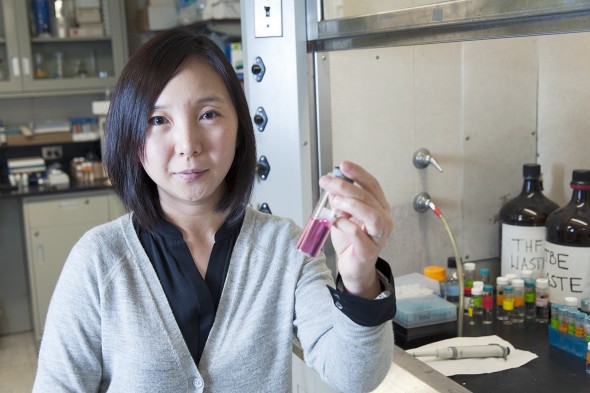When developing technology, listen to what society needs

Ying Liu: “I’m very positive, very optimistic, that engineers can make anything, as long as we listen and understand what it is we should make.” — Photo: Roberta Dupuis-Devlin
Ying Liu, associate professor of chemical engineering, already an accomplished, if young, interdisciplinary researcher, says she recently changed her philosophy toward research.
The insight came during a current project to develop nanomaterials to encapsulate drugs that have difficulty reaching their site of action in the body. Under the National Science Foundation’s Innovation Corps program, the team of Liu as principal investigator and her predoctoral student as the entrepreneurial lead interviewed more than 100 users and others in the business chain – suppliers, regulators, pharmacists and even social workers – regarding the technology she was developing.
“We were able to develop new materials with special structures and properties,” she said, “but we need to hear what patients, and what society, need.” In this case, she said, effective HIV/AIDS drugs that must be taken for life and cost thousands of dollars each month were only being used by 25 percent of eligible patients.
“We thought it was because of the high price,” Liu said, “but the actual problem in the US is the adherence of the patients due to the frequent and huge doses.”
Liu developed a scalable process to generate polymeric nanoparticles that can encapsulate water-insoluble compounds. She studies the self-assembling mechanisms of of the nanoparticles using state-of-the-art techniques and tools, including a synchrotron X-ray beam integrated with microfluidic reactors at Argonne National Laboratory’s Advanced Photon Source.
She is also part of a team of collaborators at four institutions funded by the Defense Department to develop nanoparticle‐based treatments for traumatic bleeding that can be given for immediate first aid. The nanoparticles mimic the structure and function of human platelets and are completely biocompatible. She says they will soon undergo testing for safety.
“I’m very positive, very optimistic, that engineers can make anything,” she said, “as long as we listen and understand what it is we should make.”
Liu came to UIC in 2008, and since then has been awarded more than $1.25 million in funding as a principal investigator. She is currently in the middle of a five-year CAREER award from the NSF.
Liu received her undergraduate degree in engineering mechanics from Tsinghua University in Beijing and her doctorate in mechanical and aerospace engineering from Princeton University. She did postdoctoral research in chemistry at the University of Chicago.
